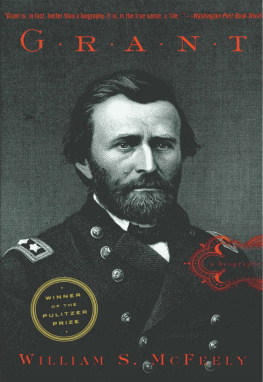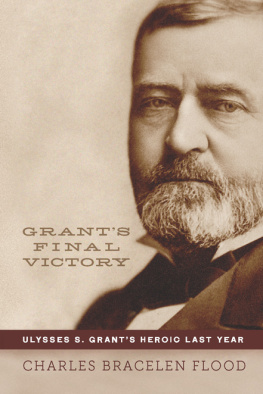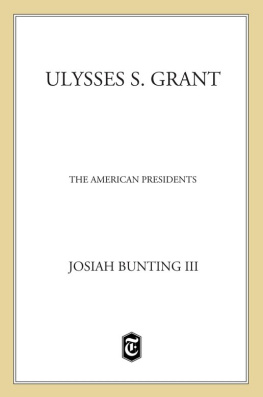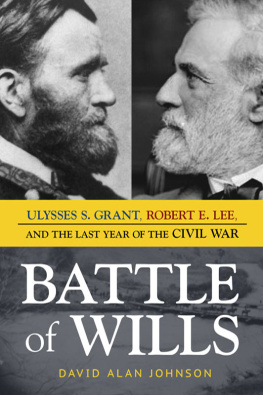GRANT

GRANT
A BIOGRAPHY
WILLIAM S. McFEELY
W W Norton & Company
NEW YORK LONDON
Frontispiece: Photograph of Ulysses S. Grant taken in Mathew Bradys studio.
Library of Congress
Copyright 1981 by William S. McFeely
All Rights Reserved
For information about permission to reproduce selections from this book, write to Permissions, W. W. Norton & Company, Inc., 500 Fifth Avenue, New York, NY 10110
Library of Congress Cataloging in Publication Data
McFeely, William S.
Grant: a biography
Bibliography: p.
Includes index.
1. Grant, Ulysses Simpson, Pres. U.S., 18221885. 2. United StatesHistoryCivil War, 18611865Campaigns and battles. 3. United StatesPolitics and government18691877. 4. PresidentsUnited StatesBiography.
E672.MI5 1981 973.8' 2'0924 |B| 80-25279
ISBN : 978-0-393-32394-8
W. W. Norton & Company, Inc.
500 Fifth Avenue, New York, N.Y. 10110
www.wwnorton.com
W. W. Norton & Company Ltd.
Castle House, 75/76 Wells Street, London WIT 3QT
Epigraph for chapter X: Copyright 1974 by Richard Wilbur, Reprinted from The Fourth of July in his volume The Mind-Reader by permission of Harcourt Brace Jovanovich, Inc. Originally published in The New Yorker .
For Jennifer, Eliza, and Drake and
in memory of their grandfather, who
drove an ambulance in another American war
and in 1919 came home from France
on the S.S. President Grant .
Contents
Preface
MANY PEOPLE helped me while I was working on this book, and I am troubled that I will not succeed in naming them all. I have been the beneficiary of assistance from skilled archivists across the country, and I particularly want to mention the help of Sara Jackson and Oliver Orr. Librarians at Mount Holyoke CollegeAnne Edmonds, Nancy Devine, Phyllis Joyce, Irene Cronin, and Dorothy Fiegenbaumwere of immeasurable assistance.
I have had generous financial support from the American Council of Learned Societies, the National Endowment for the Humanities, and the Faculty Grants Committee of Mount Holyoke College. I spent particularly enjoyable and productive periods of work at the Huntington Library and the Institute of Historical Research and I am grateful for the differing but equally excellent hospitality in California and London.
Everywhere I went, the surprisingly large and heterogeneous community of fans of Ulysses Grant encouraged me. My interpretation of Grant will not please all of them, but I hope the fact that I have taken him seriously will. While disagreeing with his policy with respect to access to materials, I am much indebted to John Y. Simon, who has done a splendid job as editor of the published papers of Grants early career.
It is a particular pleasure to say a word of thanks to the students in my Civil War and Reconstruction seminar. As they have climbed across our immense (and sturdy) table refighting Shiloh they have taught me much about Grant. Several of them have done prodigious and useful research on particular aspects of his career, and I especially want to mention Judi Sanzo, Christopher Clarke, Nancy Ledogar, Andrea Roschke, Michael Tomana, Harriet Winer, Carol Ann Drogus, Andrea Mattei, Brenda Tinker, and Monique Chireau. Another historian, Eliza McFeely, contributed much to the books preparation, as did Kathleen Heath and Dorothy Snow.
Conversations with historians like Russell Weigley, Robert Schwartz, and Willie Rose, in sometimes brief but often critically important moments, were of great assistance. R. Hal Williams and Howard C. Westwood read the whole of the manuscript in an earlier draft, and their patient and thorough criticism was immensely valuable, as was that of Adolf Wood. My editors at Norton have been excellent; James Mairs has been wonderfully steadfast and Esther Jacobsons disciplined hand greatly strengthened the book. Joseph Elliss candid and constant encouragement was indispensable, and Sarah Youngblood, Marjorie Kaufman, and Mary McFeely labored over the manuscript with more skill and love than its author deserved.
W.S.M.
York, Maine
August 1980
Introduction
it is not right for a writer to enjoy or not enjoy her characters. A writer writes what she sees.
Lillian Hellman
WHY G RANT ? This question was asked of me many times while I was writing this book. Ulysses Grant is, after all, a curious choice for the subject of a biography if the writer is not an admirer of warfare and is not inordinately fascinated by political corruption. I came to him neither because I had discovered some extraordinary mass of evidence that would enable me to greatly revise accounts of the events of his career nor because I had manufactured an intricate theory that would enable me to claim that I had found a new Grant. No amount of revision is going to change the way men died at Cold Harbor, the fact that men in the Whiskey Ring stole money, and the broken hopes of black Americans in Clinton, Mississippi, in 1875.
As the reference to Clinton suggests, one subject of great interest to me that did draw me to Grant was that of race relations. Black people were, in overwhelming numbers, enthusiastic partisans of his, and the immensely popular president went into office with a Supreme Court and a Congress also of his party. The opportunity for Reconstruction would seem to have been immense. I have never been satisfied with existing explanations of why hopes for Negro advancement were so high when Grant moved into the White House, and so low eight years later. In the book considerable attention is given to discussing how it was that the opportunity for Reconstruction was not, in the main, taken; but even the examination of Grants role in racial matters, as important as I believe it to be, is not justification for a biography.
What I found compelling about Grant as a subject for a biography was the man himself. I liked the way he looked; the picture of the mild, rather small person slouched comfortably in front of a tent suggested neither the fierce killing warrior nor the bumbling and perhaps crooked politician that I had often read about. Looks can be deceiving, of course, but they are not necessarily so. There is almost no glamour in the figure; despite the attempts of countless eulogists, he cannot be made into a Wellington or a Napoleon. It is significant that Grant himself was nicely crotchety about such comparisons, particularly those to Napoleon, whom he detested. There was in Grant neither the sensuous power of the Corsican nor the force of the Iron Duke. He was a more relentless warrior than either and yet remained the ordinary man seen in his pictures.
What was such a man doing commanding the armies of the Republic and then serving as its president? There are historians who, when asked to contemplate Grant, insist that he must have had some secret greatness, hidden within him, that allowed him to accomplish what he did. They speak of the quality almost as if it were some special organ implanted in the bodies of a particular few. I leave to others the problem of accounting for a Mozart or a Marx, but I am convinced that Ulysses Grant had no organic, artistic, or intellectual specialness. He did have limited though by no means inconsequential talents to apply to whatever truly engaged his attention. The only problem was that until he was nearly forty, no job he liked had come his wayand so he became general and president because he could find nothing better to do.
This seemingly flippant remark is made out of respect for the dilemma posed by Ulysses Grant. He had, all along, ideas and a sense of himself that he could make no one notice. Those who search the past exclusively for greatness are frequently unmindful of the extent to which ideas fill the minds of ordinary people. Those who look at such men and women collectively may be aware of the general needs and aspirations of various groups, but only the best of the social historians and the historians of local politics seem conscious of the complexity of concern of the individuals within the groups and of the attendant frustration when that concern cannot be heard. People assume that had fame not come to them, Ulysses and Julia Grantbeing unheardwould have had nothing to say.









